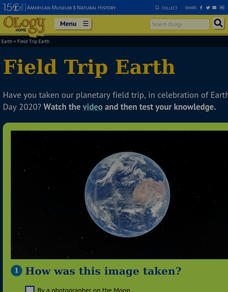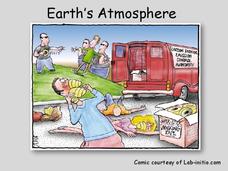Curated OER
Earth, Sun, and Moon
Young scholars participate in a demonstration and complete an online activity that illustrates the earth orbits the sun once a year, and that the moon takes approximately 28 days to orbit the earth.
American Museum of Natural History
Field Trip Earth
Take a field trip around Earth by way of satellite images. Learners watch a video lesson that describes different images taken from orbiting satellites. They then test their visual skills in a 14-question online quiz.
Curated OER
Planet Earth
In this Earth worksheet, students review 13 terms associated with the Earth's rotation, revolution, and orbit. Students find the terms in a word search and then fill in the term next to its definition.
NASA
Earth, Can You Hear Me Now?
How long did you say? Class groups plot the distances between Earth and Mars and determine the trigonometric function that models the data. Using a calculator, they graph the function to determine when the distance and communication...
Curated OER
Science Jeopardy - The Earth Sciences
The earth sciences are the focus for this Jeopardy-style review game. Categories include geology, space, scientific investigation, meteorology, and oceanography. Diagrams and pictures are involved with most of the questions, making this...
K12 Reader
Why Does the Moon Orbit Earth?
Have you ever looked up at the moon and wondered why it looks different every night? Learn about the moon's orbit and the lunar cycle with a reading comprehension exercise. Using context clues, kids find the definitions of unfamiliar...
It's About Time
How Do Earth's Orbital Variations Affect Climate?
How does Earth's orbit around the Sun affect climate? This third installment of a six-part series looks at how Earth's orbit affects the amount of insolation at locations on Earth involves different experiments used in conjunction...
NASA
Earth and Space—Climate and Seasons
Why does Earth have so many seasons? Learn about the importance and changes of our planet's climate with a series of learning activities, which focus on connecting seasons to past experiences, making scientific observations, and...
Scholastic
Study Jams! Seasons
Use this during the season of teaching about the seasons! As Earth revolves around the sun, its tilt causes the weather to change. The graphics in this presentation show how Earth's position in space has an effect on the angle of...
Laboratory for Atmospheric and Space Physics
Orbit Simulator
Researchers think they have evidence of a new planet deep in our solar system that is the size of Neptune and orbits the sun far beyond Pluto. The orbit simulator shows the orbits of our well-known planets, as well as Pluto and the comet...
Science Geek
Earth's Atmosphere
Ozone gas absorbs the harmful UV-B rays and helps protect humans. An informative presentation begins with the layers of the earth's atmosphere, the pressure and temperature in each of the layers, the ozone layer, the ozone cycle, and the...
Curated OER
Flight Paths of Orbiting Satellites
Students examine the path a satellite follows as it orbits the earth. In this space science lesson, students use a globe as they illustrate a satellite in its orbital plane, then plot points on the satellite's path on the globe to see...
Curated OER
View of a Comet from Earth
Students investigate comets. In this space science lesson, students study overhead transparencies of the orbits of Earth and a comet. Students identify various locations and times where comets would be visible from Earth.
Curated OER
Reading Comprehension Worksheet: Planet Earth
After reading five short paragraphs about planet earth, students must answer 4 comprehension questions about the topic. This worksheet provides great practice for state testing in language arts.
Curated OER
Earth Science Regents: The Ellipse
Starting with the instructions to draw an ellipse, and with great pictures, this sheet should help your pupils learn the shapes and measurements involved. Using push pins and string, your class can discover the axis and focus points...
CK-12 Foundation
Satellites, Shuttles, and Space Stations: Satellites in Orbit
Blast off! How do satellites, space shuttles, and space stations escape Earth's gravity and achieve orbit? Young astronauts study rocket science (literally) with an interactive lesson. They discover the four main uses for satellites, how...
California Academy of Science
Kinesthetic Astronomy: The Meaning of a Year
How many times have you traveled around the sun? Aspiring astronomers grasp what a year is and they differentiate between orbit and rotation by walking around the sun right within your classroom. Place a lamp in the center of the room to...
California Academy of Science
Kinesthetic Astronomy: Birthday Stars
Space explorers take a virtual trip around the sun right within your classroom! They stand in a circle facing away from the "sun" (a lamp) in the center of the room. As they move according to your instructions, they view different...
California Academy of Science
Kinesthetic Astronomy: Longer Days, Shorter Nights
A lamp, four globes, and some signs taped around the room are all you need to set up a solar system simulation for teaching how Earth's tilted axis creates the seasons. (Sticky dots are also needed, but not mentioned in the materials...
World Wildlife Fund
Land of the Midnight Sun
From days of 24 hour sunlight, to endless nights that last for days, the Arctic is a very unique place to live. Examine the seasonal changes that occur in the northern-most reaches of the globe and the impact they have on the plants and...
Curated OER
Seasons Worksheet #1
First, your earth science pupils determine what season is depicted in a diagram of the tilted Earth as it receives radiation from the sun. They answer multiple choice questions about occurrences at different points on Earth in the...
Curated OER
The Moon Orbits the Sun?!?!
Young scholars calculate the strength of gravitational force exerted on the moon by the sun and earth. In this orbital activity students view a demonstration to see the gravitational forces between bodies.
Curated OER
The Four Seasons - Earth's Axis
Students explain that it is the tilt of earth's axis that causes the seasons. They engage in a variety of activities, both teacher-led and on the computer, which enable them to further explain how the Earth's axis affects the seasons.
Other popular searches
- Earth's Orbit
- Earth Orbit
- Earths Orbit
- Earth's Rotation Orbit
- Earth Orbit the Sun
- Earths Orbit Around Sun
- Earth Orbit Sun
- Earth Orbit Seasons
- Moon Earth Orbit
- Gravity Moon Earth Orbit
- Earth Orbit Rotation
- Earth's Orbit Seasons

























